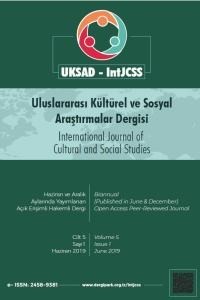Recreation of Culture Specific Items in the English Translation of Latife Tekin’s Berci Kristin Çöp Masalları
Literary translation, modern Turkish literature, culture specific items translation strategies, Javier Franco Aixela,
___
- Aixela, J F, (1996). “Culture-Specific Items in Translation.” In R. Alvarez & M. Carmen Africa Vidal (Ed.), Translation, Power, Subversion,). Clevedon: Multilingual Matters, 52-78.
- Aydın, S. (2008). “Sevgili Arsız Ölüm’ün Olağanüstü Gerçek Korkuları.” Millî Folklor [National Folklore], 20/79 : 90-93.
- Balık, M. (2013). “Çevreci Eleştiri Işığında Latife Tekin'in Romanları.” Çevrimiçi Tematik Türkoloji Dergisi [Online Thematic Journal of Turkic Studies], 1: 1-16.
- Basnett, S. (1998). Translation Studies. London, the UK: Routledge.
- Bassnett, S., Lefevere, A. (1992). Translation/History/Culture: A Sourcebook. New York, ABD: Routledge.
- Bassnett-McGuire, S. (2002). Translation Studies. New York: Taylor & Francis.
- Catford, J C. (1965). A Linguistic Theory of Translation: An Essay in Applied Linguistics. Oxford: Oxford University Press.
- Chesterman, A., Arrojo, R. (2000). “Shared Ground in Translation Studies,” Target 12 (1): 151–60.
- Jakobson, R. (1959). “On Linguistic Aspects of Translation,” On Translation, edited by Reuben Brower, Harvard, Massachusetts, ABD: Harvard University Press, 232-39.
- Munday, J. (2001). Introducing Translation Studies: Theories and Applications. Oxon: Routledge.
- Nida, E. (1969). The Theory and Practice of Translation. Boston, USA: Brill.
- Pym, A. (1998). Method in Translation History. New York, USA: St. Jerome Publishing.
- Robinson, D. (1997). Translation and Empire: Postcolonial Approaches Explained. Manchester: St. Jerome.
- Schleiermacher, F. (1813/2012). “On the Different Methods of Translating”, Çev. Susan Bernofsky, The Translation’s Studies Reader, 2. bs. Ed. Lawrence Venuti, Londra & New York: Routledge, 43-63.
- Schulte, R., Biguenet, J. (1992). Theories of Translation: An Anthology of Essays from Dryden to Derrida. Chicago & London: The University Press of Chicago.
- Snell-Hornby, M. (2006). The Turns of Translation Studies: New Paradigms or Shifting Viewpoints?. Amsterdam/Philadelphia: John Benjamins.
- Tahir-Gürçağlar, Ş. (2011). Çevirinin ABC’si. İstanbul: Say Yayınları.
- Tekin, L. (1984). Berci Kristin Çöp Masalları. İstanbul: Adam Yayıncılık.
- Tekin, L. (2000). Berji Kristin: Tales from the Garbage Hills (Trans. Saliha Paker, Ruth Christie). London, the UK: Marion Boyars Publishers Ltd.
- Tiken, S. (2015). “Latife Tekin Romanlarında Arketipsel Bir Motif: Yükseliş Deneyimi.” Uluslararası Sosyal Araştırmalar Dergisi [The Journal of International Social Research], 8/40: 150-157.
- Tymoczko, M., Gentzler, E. (2002). Translation and Power, Boston: University of Massachusetts Press.
- Venuti, L. (1995). The Translator’s Invisibility: A History of Translation. Londra & New York: Routledge.
- Yazıcı, M. (2005). Çeviribilimin Temel Kavram ve Kuramları. İstanbul: Multilingual.
- Başlangıç: 2015
- Yayıncı: Mutlu TÜRKMEN
Türkiye’de İllerin Rekabetçilik Düzeyine Göre Sınıflandırılması
Barış Ergül, Arzu ALTIN YAVUZ, Hasan Serhan YAVUZ
Türkiye’nin Radyo ile Tanışması ve Türk Telsiz Telefon Anonim Şirketi
Sosyal Medyada Öz-Temsil ve Ötekiliğin ‘Öteki Boyutu’: ‘Karikateist’ Toplumsalı Üzerine İnceleme
Bireysel ve Toplumsal Boyutlarıyla İslam’da ‘İhsan’ Erdemi
Sosyal Paylaşım Siteleri ve Demokratikleşme İlişkisi: Facebook Örneği
Vincent Van Gogh’un Sanatında Özdeşleyim ile Varılan Aşkınlık ve Günümüz Doğa Sanatı
